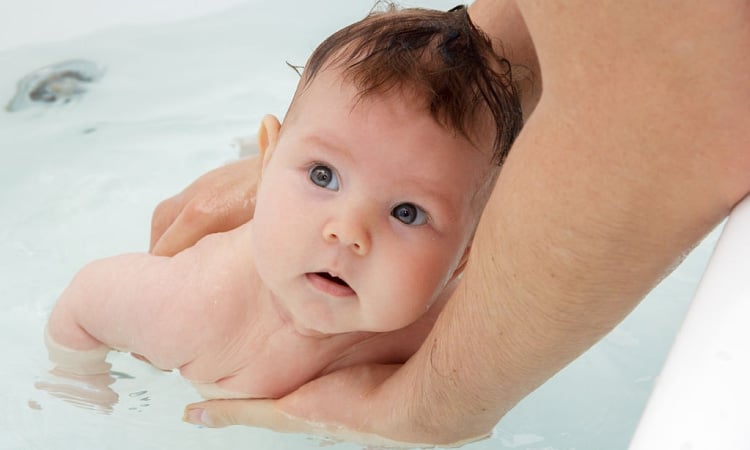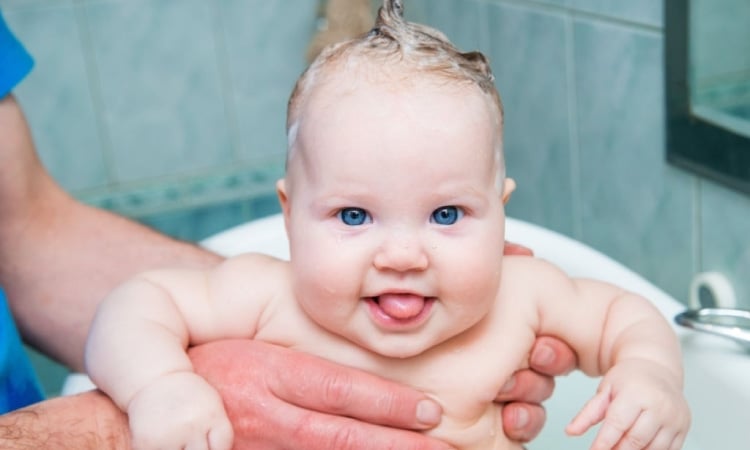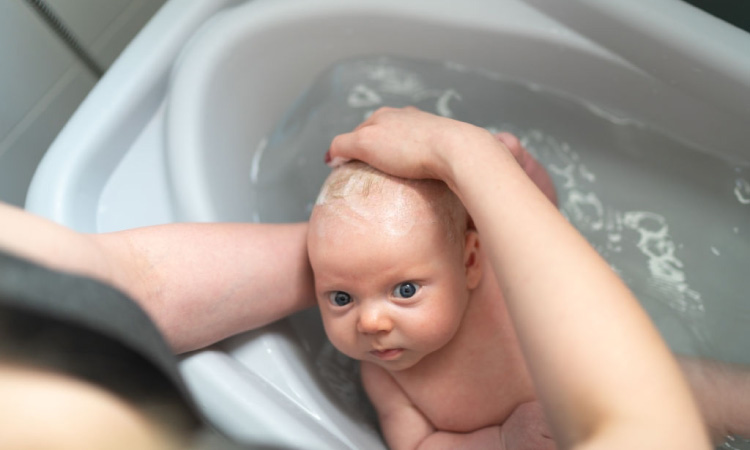Bathing a newborn can be a nerve-wracking experience. Bathing a few days old baby or a 1 month old baby will be more stressful for the new mothers. With some patience and practice, bathing a 2-month-old or bathing a 3-month-old baby will be more comfortable.
This article will help in clearing all the basic doubts of new mothers regarding bathing one to three-month-old babies. This blog walks new mothers to different topics, like baby bath timing, frequency, safety, and more.
Benefits Of Bathing Baby
Bathing your baby offers advantages that go beyond a simple cleanup.
Here are some of the most important advantages of bathing your baby:
- Bathing helps enhance the mother-baby bonding
- Bathing is one of the top ways to soothe a fussy baby
- Bathing before bedtime helps the baby sleep well
6 Basics Of Bathing A Baby (1-3 Months)
You can start giving the baby complete baths once the umbilical cord stump has come off. You are supposed to give the newborn a sponge wash till then. Water, according to research, increases the risks of stump infection if not thoroughly dried after a sponge wash.
Bathing a newborn might be difficult at first and that’s why we have some baby hygiene tips. New mothers should make use of the support of a spouse or family member if possible. Following are six basics of bathing a 1-3-month old baby:
1. Baby’s bathing room must be warm enough
Newborn babies, unlike older babies are not always bathed in the bathroom or a bathtub. Babies are ready for bathtubs when they can sit up on their own, which is usually about 6 months.
Babies lose a lot of body heat very rapidly. When their clothes are removed for a bath, they lose body heat a lot faster. Wet babies feel chills faster.
Therefore, it is important to make sure the baby’s bathing room is sufficiently warmed before giving the baby bath. For this,
- Try bathing your baby in a small, enclosed room, and not a large open area (like an open yard)
- If you are bathing your infant in a bathroom, you can use a space heater to warm up a cold bathroom if necessary
- Undress the baby only while the water and other materials (soap, towel, changing clothes, one towel to pat dry the baby, and a fresh towel to make the baby lie down while drying and changing clothes, etc.) are within your reach
Related Reading: 9 Tips To Keep Baby Warm At Night In Winters
2. Baby’s bathing water should be warm enough
Only when the temperature of the water is right then the baby enjoys bathing. Warm water is ideal for a baby bath. If the water is not warm enough, the baby gets chills. On the other hand, if it crosses the ideal temperature, water can bring about dry skin in babies. It can even scald the soft and sensitive skin of your baby. We recommend a few baby products for your baby’s sensitive skin but new mothers should test the water temperature with their elbow and make sure that water is warm and not hot.
Temperature between 37 degrees Celsius and 38 degrees Celsius is considered safe for bathing a baby. This will prevent burns and chills while bathing. While mixing the hot and cold water to get the ideal temperature, make sure you mix it well so that there will be no hot or cold spots in it.
Floating thermometers come in all colours and shapes resembling bath toys. This will help you ensure that the water is comfortably warm for the baby at all points of bathing time.
3. Hold the baby carefully

Maintain a strong grip on your baby during the bath. Soapy bodies are dangerously slippery. A secure grip will make your baby feel more secure and you, more confident. Use your non-dominant arm to hold your baby’s head and neck while the other hand bathes the baby.
4. Methodical bath makes the process easy
A planned and systematic baby bathing helps reduce the stress of new mothers.
- Always start with the baby’s face and then deal with the dirtiest parts of the body. This will prevent the rinsed area from being getting soapy again
- If you want to hair wash your new born baby also, no issues. This should be the last step after which you can dry the baby starting from head to toe
- When washing your baby’s hair, you can even use a drop of gentle baby shampoo
- Rinse the shampoo off with two to three cups of water. While doing so, place one hand on the baby’s forehead to avoid water with shampoo getting into the baby’s eyes
- Wrap the baby in a bath towel after bathing. make sure you covered the baby’s head and body well. The towel absorbs most of the water
- Now let the child lie on a clean towel. With another soft towel dry the baby thoroughly, paying special attention to the folds of the skin
5. Avoid distractions at all costs
During bath time, you should devote all of your attention to the baby. Even though each phase of the bathing process takes little time, it requires the complete focus of the person who bathes the baby. Big mishaps happen in short periods of distraction and that’s why there are a few baby proofing ideas to ensure there are no accidents, inside the bathroom and as well as outside.
Never, ever leave your infant alone when bathing, drying, or dressing. Even if they are not old enough to roll on deliberately, they may roll over accidentally. Remember that a baby may drown in as little as an inch of water, and in such a short period of time.
6. Establish a routine
Whether you choose a bedtime or a daytime bath, try to bathe the baby at the same time every day. This will eventually establish the baby’s body clock. When bath time arrives, the baby will understand that the bath time is approaching and will be mentally prepared for it. Babies hate surprises.
Of course, if your infant is hungry, cranky, or has an upset stomach, you may postpone the bath. Otherwise, try to stick to the routine.
How Often Should You Bathe Your Baby?
You don’t have to bathe your new born baby every day. Three times per week ought to be plenty until your baby gets more active. Too many frequent baths can dry out your baby’s skin.
While changing diapers and cleaning up the spit-ups, you are already dealing with critical parts that get dirty faster. Since the face, neck, and diaper areas are cleaned frequently, bathing three times a week is more than enough for the baby.
However, in the hot and sweaty summer, you can bathe baby every day. In that case, give a plain water bath (don’t use soap) every day and give a normal bath, as usual, three times per week. In any case, more than one bath per day is a big NO.
Why Not Bathe the Baby Every day?

Babies do not get dirty in the same way that adults do. Therefore, they only need bathing a few times a week at least for the first few months of their lives. Because your baby’s skin is way more delicate than yours, bathing the baby too often may have an opposite impact on the baby’s skin.
It is found that bathing your baby too frequently may double the risks of contracting skin issues such as eczema.
Related Reading: 10 Safe Home Remedies For Baby Diaper Rash
What Is the Right Time to Bathe My Baby?
There is no best time of day to bathe the baby. To put it another way, bathing your baby at any time is ideal. The time that works for one baby may not always work for another. However, it is best to avoid bathing your baby when he or she is hungry or immediately after a feed. Consider giving the baby some time to settle the food before bathing.
Choose a time when you are not in a hurry or may be interrupted. Some parents choose to take a bath in the morning when the child is awake. Others prefer to incorporate baby baths into a soothing bedtime routine.
Is It OK To Bathe Baby Once A Week?
Yes, it is okay to bathe the baby once a week, especially during the winter. According to ABC News, a mother claims to bathe her baby once a week.
On the other hand, bathing your newborn less than once a week may cause:
- Rashes between the creases of their skin
- It increases the chances of diaper rash
To be more specific, not washing the baby every day does not absolve you of the responsibility of ensuring that your baby is clean. Specific parts of your baby’s body must remain clean always:
- Wipe away drools and wipe the cheeks and necks
- Pay special attention to skin creases
- Ensure that the baby’s genital regions are cleansed regularly
Is A Sponge Bath Good for Baby?
Sponge baths are advised by doctors until the umbilical cord stump comes off, which might take a week or two. It is also vital to give the infant a sponge wash on days when he or she does not receive a normal bath.
Only expose the portions of your baby’s body that are being washed during a sponge bath. This aids in keeping your infant warm.
Wet the washcloth, wring it out, then clean your baby’s face with it. Wipe the inner to the outer corner of each eyelid. Particular attention should be paid to the wrinkles under the arms, behind the ears, around the neck, and in the diaper region. Clean between your baby’s fingers and toes as well.
Related Reading: 18 Baby Accessories That Can Be Unsafe
When Should You Start Bathing Your Baby Every Day?

One of the most repeated questions in many new mother’s forums is “When to start bathing baby daily?”
In fact, doctors do not recommend that babies take a bath every day. Excessive exposure to water can dehydrate the skin and worsen conditions such as eczema. However, if you don’t bathe your baby often, it can also bring about skin infections and aggravates existing eczema.
In terms of “when to start bathing baby every day”, the answer is “from around six months”. Babies become much more active between the ages of six months and one year. Your baby will either crawl or begin to walk. At this point, you can start bathing the baby every day.
Conclusion
Bathing their little one is a memorable event for many parents. Knowing the basics will help new mothers enjoy this bonding time more relaxed. Just make sure your baby stays comfortable throughout the bathing and while changing clothes. And most importantly don’t forget to gather all the essentials you need for bathing the baby in advance.
FAQs
Here are some of the most commonly asked questions from parents regarding baby bathing.
If your baby has a cradle cap, use a soft-bristle brush to gently remove the scales. Building up scales may be avoided by brushing on a regular basis. It is more beneficial to brush the scales after using oil or gentle baby shampoo.
However, avoid picking or scraping at their scalp. Also, keep in mind that excessive washing might lead to an increase in oil production. Shampooing every two to three days is a good practice.
Even though medicinal shampoos intended to remove cradle caps are available on the market, never use them without first consulting a doctor. Sulphur and salicylic acid are both present in these shampoos. As a result, while they may remove the scales more rapidly, they may irritate the baby’s delicate skin.
Put two tablespoons of baking soda in the bathing water. Baking soda in warm water makes excellent bathing water that helps heal diaper rash and lessen the redness associated with it. Also, baking soda takes out dirt, oil, and sweat that are the cause of itching in diaper rash.
Oatmeal bath is also found to ease diaper rash.
Limit the bathing time to ten minutes. Also, remember hot water can aggravate skin conditions like eczema. Limit the usage of soap and ask the doctor about which soap is good for a baby with eczema.
Also, make sure there is no soap residue in the baby’s skin folds after bath.
As your little one is not old enough to move around, it is perfectly fine not to bathe the baby daily. Instead, two to three baths in a week are good enough.

